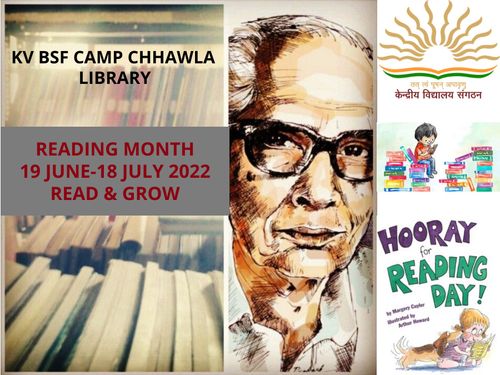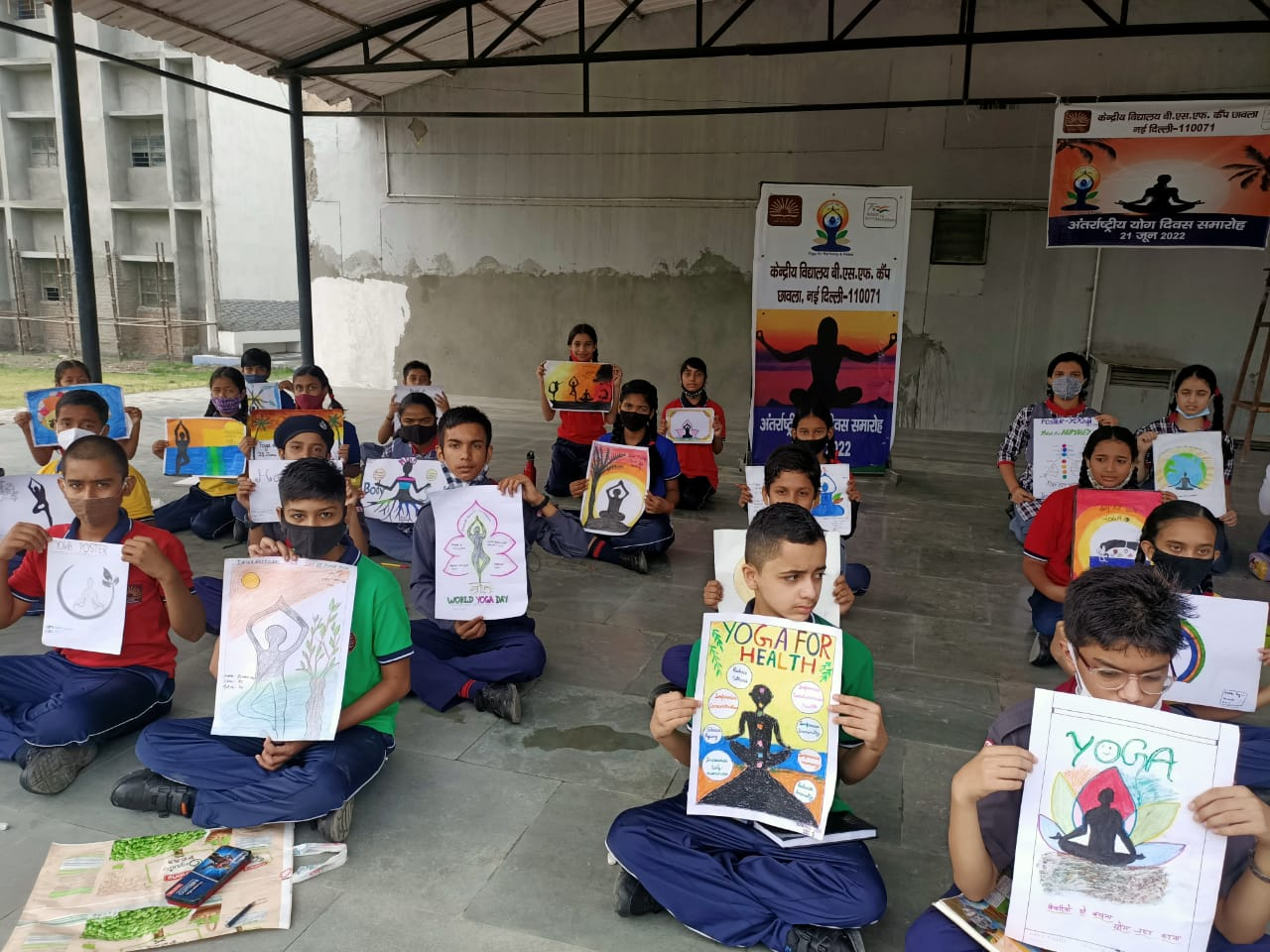header marquee
- Home
- KVS HQ
- KVS RO DELHI
- KV BSF CAMP CHHAWLA
- KV CHHAWLA DIGITAL LIBRARY
- MANODARPAN
- WAKELET
- LIBRARY ON PHONE
- BOOK CLUB
- STUDENTS CORNER
- TEACHER CORNER
- OPEN EDUCATIONAL RESOURCES
- CAREER & COUNSELLING
- DIGITAL LEARNING
- E MAGAZINE
- READING CORNER
- LINKS
- LIBRARY
- LIBRARY RULES
- LIBRARY POLICY
- ALAP
- LIBRARY NEWSLETTER
- QUIZ
- PHOTO GALLARY
- WEBOPAC
- BOOK SUGGESTION FORM
- KVS CIRCULAR REPOSITORY
- CONTACT US
NEW ARRIVALS
Sunday, 31 July 2022
Monday, 25 July 2022
Sunday, 24 July 2022
Sunday, 26 June 2022
Tuesday, 21 June 2022
Sunday, 19 June 2022
Saturday, 18 June 2022
National Reading Day: Know about P.N. Panicker
Libraries are key to the development of a society. As gateways to knowledge and culture, libraries play a fundamental role. They create opportunities for learning, support literacy, and education, and help shape the new ideas and perspectives that are central to a creative and innovative society.
Puthuvayil Narayana Panicker (1 March 1909 – 19 June 1995) is known as the “Father of the Library Movement” in the Indian state of Kerala. The activities that he initiated triggered a popular cultural movement in Kerala which led to universal literacy in the state in the 1990s.
Because of this, June 19, his death anniversary, has been observed in Kerala as Vayanadinam (Reading Day) since 1996. The Department of Education in Kerala also observes 'Vayana varam' (Reading Week) for a week from June 19 to 25. In addition, it was in 2017 that Prime Minister Narendra Modi declared June 19, Kerala's Reading Day, as National Reading Day in India. The following month is also observed as National Reading Month in India..
P.N. Panicker's Contributions
In 1926, Panicker, working as a teacher in his hometown started the Sanadanadharmam Library. Almost two decades after this, he led the formation of Thiruvithaamkoor Granthasala Sangham (Travancore Library Association) in 1945 with 47 rural libraries. The main aim of setting up these libraries was to highlight the importance of education and reading in rural areas. The association's slogan was “Read and Grow,” which epitomized the importance of books in a person’s life.
When Kerala state was formed in 1956, the association became Kerala Granthsala Sangham (SGS). Panicker went from village to village spreading the value of reading. In fact, he succeeded in bringing almost 6000 libraries into his network!
SGS won the prestigious ‘Krupsakaya Award’ from UNESCO in 1975. Panicker was its General Secretary for 32 years, until 1977 when it was taken over by the State Government. After that, it became the Kerala State Library Council, with an in-built democratic structure and funding.
After SGS was taken over by the state, Panicker decided to form the Kerala Association for Non-Formal Education and Development (KANFED). KANFED led to the beginning of the Kerala Literacy Mission, which promoted the importance of education in rural areas. This mission was the reason Kerala was able to become the first state in the country that achieved universal literacy.
The 27th National Reading Day will be celebrated on 19th June 2022, the following week as Reading Week and Reading Month will be celebrated from 19th June to 18th July 2022. A variety of events will be organized in hybrid mode in Schools/Colleges/Libraries by the P. N. Panicker Foundation. The details of these activities are available at the link: pnpanickerfoundation.org
courtesy :https://timesofindia.indiatimes.com/life-style/books/features/national-reading-day-2021-p-n-panicker-and-his-rich-literary-legacy/articleshow/83636936.cms
Thursday, 19 May 2022
Monday, 16 May 2022
The Story of Gautam Buddha (Buddha Purnima Special) 16 May
The Story of Gautam Buddha
Gautam Buddha was born as Prince Siddhartha around 566 BC to the King and Queen of Kapilavastu, Shuddhodana and Mayadevi. Soon after his birth an astrologer predicted that Prince Siddhartha was destined to lead the life of a sage and that he would give up his right to the throne and all worldly pleasures.
Shuddhodana and Mayadevi were shattered upon hearing the news and decided to prevent him from being exposed to the outside world, keeping a close watch on him.
A young Siddhartha never left the palace and saw nothing more than the luxuries of it. His parents hoped that he would get used to the luxurious lifestyle and never give it up.
At the age of 16, his parents got him married to Yashodhara who was a beautiful daughter of a nobleman, The King had hoped that this would be another reason for Siddhartha to not leave the palace.
However, as Siddhartha grew older he became more and more curious. On one particular day, he asked his charioteer to take him on a tour of the city. The first person they came across was a old man, weak and frail by the side of the road. Siddhartha was intrigued by him and was made to understand that with old age comes weakness and ill health.
The next person he came across was a sick man in great pain. Siddhartha was told that the man was not immune of diseases. He then saw the body of a dead person being carried to the cremation ground. The young Prince was told that everybody would die one day and leave the world. At the end of his city tour, Siddhartha came across a sage who was calm and serene. He was told that such men give up their worldly possession and desires.
Siddhartha was deeply troubled by his first experience of the outside world. Several questions crossed his mind about life and death. He then decided that to get answers to his questions, he would have to leave the palace and give up on his luxurious life. At the age of 29, Siddhartha left the palace at night while his wife and son were asleep. He wandered far and wide, trying different ways to find the path of truth. Then finally he reached the city of Bodhgaya and started meditating under a large fig tree.
After 49 days of meditation, at the age of 35, Siddhartha attained enlightenment. From that day on he was known as Buddha or the ‘Awakened One.’ He was named after the Bodhi tree under which he meditated.
Gautam Buddha shared his knowledge with five sanyansis who meditated with him. Together, they traveled across the country teaching key principles of Buddhism.
These principles were called the Noble Truths, which were: The world is full of suffering and misery. Desire is the cause for all suffering and misery. Suffering and misery can be abolished by removing desire. Desire can be overcome by following the Eight Fold Path.
The Eight Fold Path included: Right Views, Right Thoughts, Right Speech, Right Action, Right Livelihood, Right Efforts, Right Mindfulness and Right Meditation.
Buddha preached non-violence, peace and harmony. He strongly felt that people should treat one another with compassion, forgiveness and tolerance. He encouraged his followers to follow a balanced life. Buddha had a number of followers in Magadha, Kosala and other neighboring areas. He was always dressed in saffron robes and would take only his begging bowl when he traveled.
Several monuments have been built in India which were built as tributes to Buddhism- The world renowned Ajantha and Ellora caves, Kanheri and Karla caves, as well as temples and universities at Sanchi, Amaravati and other places.
Gautam Buddha passed away in 483 BC. Though he lived centuries ago, his birthday is still celebrated as Buddha Jayanti in India. The Bodhi tree is still worshipped as a symbol of Enlightenment even today.
courtesy https://mocomi.com/gautam-buddha/
Saturday, 14 May 2022
Ganga Quest 2022 (An international quiz on Environment and Rivers)
Friday, 13 May 2022
🏕️Super Fun Activities Help to Protect our Environment🏞️🏜️
Happy World Environment Day
Here are 7 super-fun World Environment Day Activities to help in protecting our environment:
Environment Day T-Shirt tote bag
Wind Turbine
Cardboard Box Holder
Earthworm Garden
Planting Trees Activity
Bird Feeder Activity
Earth Mask
Plant a Tree Challenge
Dear Students,
As a Part of World Environment Day Celebration.




.png)















.jpeg)



